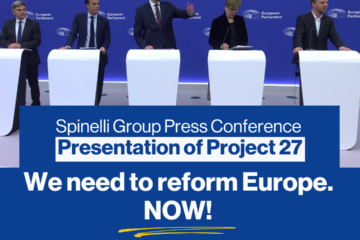The President of the European Commission Ursula von der Leyen, yesterday in the plenary session of the European Parliament urged EU leaders in vain to decide on measures to counter the adverse effects of the Covid-19 pandemic. “If you, President Von Der Leyen, really want to show that you understand that intervention is urgent, take the bull by the horns: put forward a proposal to establish the Recovery Bonds“, confronting governments with their responsibilities, Sandro Gozi, Member of the European Parliament elected in France in the lists of Renaissance, former undersecretary of European Affairs with Matteo Renzi first and then with Paolo Gentiloni, told the Adnkronos. „We leave the technical solutions to the Commission: the objective is to have the extra zero that is missing today“ in the resources allocated, „because the Europe of governments is a Europe that has failed and is failing“.
The technical ways to minimize the risk that Germany will end up paying Italy’s debts would actually exist. „That’s why – says Gozi – I call them Recovery bonds, and not Eurobonds. It is not a question of mutuality of public debt in this case, but of using different instruments, such as the EIB, to put bond issues on the market, gathering resources on markets where there is a great deal of liquidity“.
It would be, Gozi continues, „resources strictly aimed at recovery, that is, economic and health recovery, in the restart phase after the peak of the emergency has passed“.
It is for this reason, Gozi adds, „that we are insisting with the Germans, because it is not a matter of paying the debts of the Italians, but of acting together on the market, with a new leverage, to have fresh resources in addition to those already made available by governments and EU institutions, to finance an economic and health investment plan, unprecedented since the Second World War“. The Marshall Plan, which resurrected Europe from the ashes of the Second World War, was called the European Recovery Program.
If you have to add „a zero“ to the figures made available today in Europe, for Gozi, „the only way is to talk about Recovery Bonds. It is not a nominal issue, but one of substance. And for this reason, Prime Minister Giuseppe Conte was right to take up our proposal again. It is not a generalized instrument and it is not a mutualisation of the debt already accumulated by the States“.
Gozi explains, „we are working for the European Parliament to take a clear position on Recovery Bonds and to ask the Commission to take an initiative in this direction.
The Commission, reports the MEP, „is studying various proposals, but in the face of the impasse of governments, Parliament and the Commission must take responsibility to quickly make a clear proposal on Recovery Bonds, to put governments in front of their responsibilities.
Debt mutualisation is taboo in Germany and the other Nordic countries, whose governments are under pressure from nationalist forces on the right. „I believe – Gozi observes – that an agreement is also possible with Germany and Holland, if we explain to them that we are not asking them to pay our debts, but we are asking them to face all together the exit from the crisis.
This crisis is affecting Europe as a whole. The problem is that they think it will affect only a few countries: Italy, France and Spain”. Instead, continues the MEP, „unfortunately this is not the case: the virus affects the whole world. That’s why we’re working with the Germans: I worked a lot with Rainer Wieland, from CDU, through the Union of European Federalists. Wieland two days ago made the very important proposal to introduce Recovery Bonds without debt mutualisation“.
„It is a very important signal – he underlines – now we must convince the German Chancellor and the German Minister of Finance, but the statements of an important personality like Wieland, which is also the result of our work, goes in the right direction“.
„We have to wait until Easter – he continues – so that even Germany, which yesterday had 6,000 more cases, understands that this is not a moral hazard? It would be morally unacceptable not to equip ourselves with fundamental instruments for recovery. Perhaps – concludes Gozi – we must wait until Easter for Germany to understand it too“.

